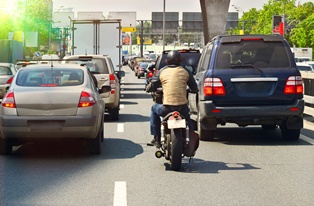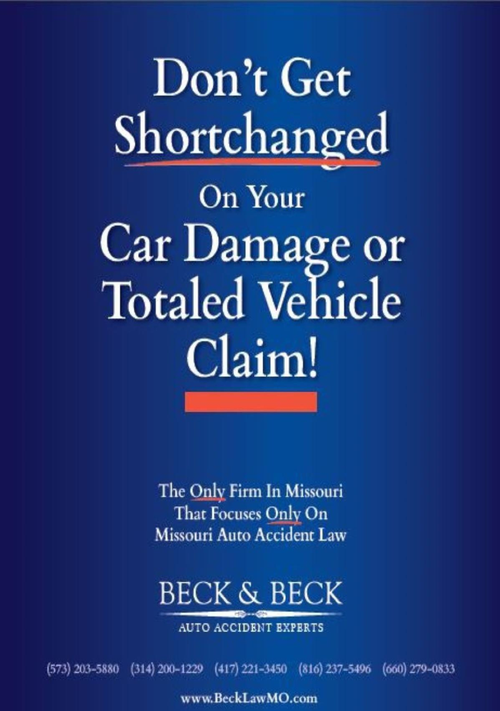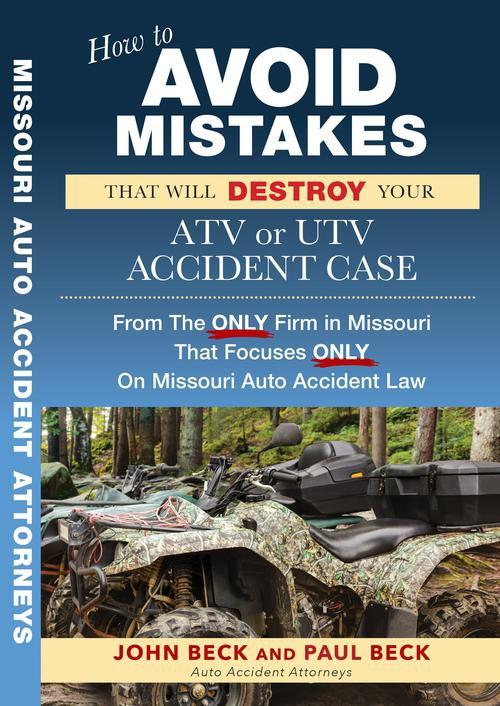Lane-splitting is legal in Missouri but is not always the safest option. Lane-splitting is when motorcyclists ride between two lanes of traffic going in the same direction instead of staying in one lane like other vehicles.
Legal Does Not Mean Safe: Lane-Splitting Could Impact Your Accident Recovery

There are not currently any laws in place in Missouri that make lane-splitting explicitly illegal. However, lane-splitting can be risky and increase the odds of getting into a collision. The close proximity between your motorcycle and the vehicles next to you means that even a minor miscalculation or a moment of inattention by a distracted driver could cause an accident.
Lane-splitting is widely considered an unsafe practice and could prevent you from recovering the highest level of damages from the other party. In Missouri, the amount of damages you can receive after an accident is based on how much blame is assigned to you for causing the accident.
You are not prohibited from filing a claim in Missouri just because you were lane-splitting. However, you may be assigned a higher degree of fault than if you were not lane-splitting and thus receive a smaller settlement, even if the other person was mostly to blame for the accident.
What Makes Motorcycle Lane Splitting in Missouri So Dangerous?
Motorcycle lane splitting—riding between lanes of slow-moving or stopped traffic—can be an appealing option for many riders in Missouri looking to navigate congested roads. However, this practice comes with significant risks that can lead to severe accidents.
- Limited Visibility: One of the primary dangers of motorcycle lane splitting is reduced visibility. When riders maneuver through tight spaces in traffic, they are often hidden from the view of drivers, who may not anticipate a motorcycle approaching from the side. This lack of awareness can result in tragic collisions.
- Unpredictable Vehicle Movements: In congested traffic situations, cars are more likely to change lanes or move suddenly. Drivers may not check their mirrors thoroughly before making a lane change, putting lane-splitting motorcyclists in harm’s way. A driver’s sudden decision to switch lanes can lead to a devastating crash.
- Limited Reaction Time: Both motorcyclists and drivers have reduced reaction time in high-traffic environments. The close proximity of vehicles can make it difficult for either party to respond swiftly to unexpected changes, increasing the likelihood of an accident.
- Proximity to Road Hazards: Lane splitting often places riders closer to road hazards, such as debris, potholes, and uneven surfaces. Encountering these obstacles can easily cause a motorcyclist to lose control, leading to potentially severe injuries.
- Legal Ambiguities: Missouri does not have a definitive legal stance on motorcycle lane splitting, leaving many riders uncertain about the implications of their actions. This ambiguity can complicate accident claims, especially if a rider is involved in an incident while lane splitting. Riders may find it challenging to prove liability, which can affect their ability to seek compensation for injuries.
Understanding these dangers is essential for motorcyclists in Missouri contemplating lane splitting as a means to navigate traffic. The risks involved highlight the need for heightened awareness and caution while riding in such conditions.
The Difference Between Lane Filtering vs Lane Splitting in Missouri
Motorcyclists in Missouri often use both motorcycle lane splitting and lane filtering as strategies to navigate through traffic, but these practices have key differences.
- Motorcycle Lane Splitting: This involves riding between lanes of moving traffic. While some riders may find it a useful way to bypass congestion, it also increases the risk of accidents. Motorcycles are smaller and less visible, making it difficult for drivers to notice them. The unpredictable movements of other vehicles can lead to collisions, leaving riders particularly vulnerable to injury.
- Lane Filtering: In contrast, lane filtering refers to the act of moving to the front of a line of stopped or slow-moving vehicles, typically at traffic signals. While lane filtering allows motorcyclists to avoid the frustration of waiting in traffic, it does come with its own set of risks. Motorcyclists must be vigilant as they approach stopped vehicles, as drivers may not always be aware of their presence and could inadvertently cause a rear-end collision.
Both practices require careful consideration and awareness of the surrounding traffic environment. Although lane filtering is often viewed as a safer alternative and is legal in many places, motorcycle lane splitting remains a controversial practice, particularly in states like Missouri. Riders should stay informed about the laws governing these practices and the inherent risks involved to make safe decisions on the road.
Why Do Motorcyclists Split Lanes?
Motorcyclists may opt for motorcycle lane splitting for several compelling reasons:
- Time Efficiency: One of the primary motivations for lane splitting is to navigate around traffic delays. By moving between lanes of stopped or slow-moving vehicles, riders can often reach their destinations more quickly, avoiding the frustration of being stuck in traffic.
- Heat Management: Riding can generate significant body heat, particularly during the warmer months. By engaging in lane splitting, motorcyclists can minimize the time spent idling in traffic, helping them stay cooler and more comfortable on the road.
- Comfort and Convenience: Many riders find that avoiding traffic congestion enhances their overall riding experience. The ability to maneuver through congested areas not only makes their journey more enjoyable but can also encourage more people to choose motorcycles as a practical transportation option.
While these motivations may seem reasonable from a rider’s perspective, they also increase the risks associated with motorcycle lane splitting. For example, while the practice can help prevent rear-end collisions by keeping motorcyclists in the so-called “safe zone” between cars, it can also expose them to dangers. Larger vehicles may change lanes unexpectedly without seeing a motorcycle, and projecting side mirrors can become hazardous obstacles. Additionally, the presence of pets or children sticking their heads out of windows can further complicate the lane-splitting scenario.
Moreover, some riders may engage in excessive speeding while lane splitting, which heightens the risk for everyone on the road. Due to these factors, many states, including Missouri, explicitly ban motorcycle lane splitting, while a few allow a modified version known as “lane filtering.”
Understanding the reasons behind motorcycle lane splitting helps clarify its associated risks and underscores the need for cautious riding practices.
Can I Still Sue For My Injuries if I Was Lane Splitting When the Accident Occurred?
Absolutely, you can file a claim even if you were engaged in motorcycle lane splitting at the time of the accident. Just like any other injury claim, the key factor in determining compensation is liability. The fact that you were lane splitting does not automatically mean you are at fault for the accident or the resulting injuries. Therefore, you can pursue your injury claim regardless of whether you were lane splitting when the incident occurred.
How Lane Splitting Affects Your Claim Value
The impact of motorcycle lane splitting on your claim’s value can vary based on the specific circumstances surrounding the accident and how the court or jury perceives lane splitting. While some may view it as a risky behavior, others may recognize it as a legitimate maneuver to avoid traffic hazards. The actions leading up to the accident and the context of your lane splitting will be critical in assessing your claim’s value.
What if You Were Partly to Blame for the Accident?
It’s natural to feel inclined to apologize to the other party involved in the accident, especially if you were lane splitting. However, it’s essential to refrain from making any statements that could be construed as an admission of guilt or fault.
Remember, insurance companies are profit-driven organizations. They often look for reasons to minimize the value of your claim. Avoid providing them with any statements that could weaken your position.
If the court determines that you are partially at fault for the accident, your compensation may be affected. Missouri follows a modified comparative negligence rule, which means your right to receive the full value of your injury claim could be diminished.
Under this law, each party is only liable for their percentage of fault. For instance, if you are found to be 30% at fault for the accident while lane splitting, your compensation would be reduced by that percentage.
Understanding these nuances is crucial for motorcyclists who engage in lane splitting, as it could influence both the claims process and the potential compensation you might receive.
Liability in Motorcycle Accidents Involving Lane-Splitting in Missouri
Determining liability in accidents involving motorcycle lane splitting can be quite complex. Several critical factors come into play when courts and juries assess responsibility for a crash:
- Motorcyclist’s Actions: The manner in which the motorcyclist operates their vehicle is crucial. If the rider engages in aggressive lane splitting, such as weaving unpredictably between lanes or exceeding speed limits, this may contribute to liability. Conversely, if the motorcyclist demonstrates safe and cautious behavior, like signaling adequately and maintaining a safe speed, it can help mitigate claims of negligence.
- Driver’s Negligence: The actions of other drivers on the road also significantly influence liability. For instance, if a driver fails to signal while changing lanes or neglects to check their blind spots, they may be found at fault for the accident. Supporting evidence, such as eyewitness accounts and traffic camera footage, can be pivotal in establishing the driver’s negligence.
- Traffic Conditions: The overall traffic conditions at the time of the accident are essential in determining fault. Factors like poor visibility due to inclement weather or unexpected road obstructions can impact how liability is assigned. Courts will consider whether these conditions made it challenging for either party to navigate safely.
- Local Laws: Missouri’s laws regarding motorcycle lane splitting can significantly affect liability determinations. Understanding local regulations and how they pertain to lane splitting is essential for both motorcyclists and other drivers. Knowing whether lane splitting is legal in specific contexts can help clarify the responsibilities of those involved in an accident.
By being aware of these factors, motorcyclists can better prepare for the potential legal consequences of engaging in motorcycle lane splitting and the implications it may have in the event of an accident.
What to Do If You’re Involved in a Missouri Motorcycle Accident
In the immediate aftermath of a collision, it can be challenging to remember what to do. Try to stay calm and take action to protect yourself.
Step 1: Ensure Your Immediate Safety
Though it is ideal not to move any evidence, moving yourself and your bike out of the traffic flow may be necessary to prevent further injuries.
Step 2: Call Emergency Services
Law enforcement can come to investigate the accident and make sure that you get medical attention. The adrenaline flow immediately following a collision may limit your ability to detect injuries, so it is essential to be assessed immediately, even if you think you are uninjured or only slightly hurt.
It may be tempting not to get treated, especially if you think you cannot afford to see a doctor, but it may be more costly not to be seen immediately following an accident because a lack of medical records can ruin your chances of getting a settlement. Retain all medical documentation you receive, as you may need it to support insurance claims or a legal case.
Step 3: Gather Evidence
Take pictures of the scene, your body, your bike, and other vehicles involved. Get contact information from witnesses and try to get their statements as soon as possible. Look around to see if there might be any traffic or security cameras that could have captured footage. Record your own statement while it is still fresh in your mind. If you are unable to gather evidence, this is something the lawyers at Beck & Beck can assist in doing.
Step 4: Contact Insurance
You will want to contact your insurance company as soon as possible to report the accident but remember not to make any detailed statements to either your own or the other party’s insurer until you have spoken to one of our attorneys. Insurance companies make money by paying out as little as possible, and it is easy for an accident victim to say things that can be used to deny or reduce a claim.
Step 5: Get Legal Help
If you have been involved in a motorcycle accident, it is essential to seek out legal counsel right away to assist you in navigating the claims process, your medical bills, gathering evidence, talking to witnesses, and more. There is the potential for the case to be resolved without going to court, but should a court case be necessary, you will want an attorney experienced in handling motorcycle accident cases in Missouri to represent your interests.
The experienced St. Louis motorcycle accident attorneys at Beck & Beck only deal with cases related to vehicle crashes. We know what to look for to present your strongest case to the insurance adjuster or jury and get you a fair settlement.
Contact the Professionals at Beck & Beck Today
If you were injured in a Missouri motorcycle accident, reach out to the experienced motorcycle accident lawyers at Beck & Beck Attorneys as soon as possible. It’s always free to call us! Don’t talk to any insurance companies about your injuries or medical treatment.
Please feel free to contact us online or call our office directly at 314.451.7586 to schedule a free consultation. We help motorcycle accident victims all over Missouri including the cities and communities of Columbia, Springfield, Kansas City, St. Louis, Florissant, Kirksville, Perryville, Union, Kirksville, Cuba, Hillsboro, Potosi, Troy, Doniphan, Steelville, Farmington, Festus, Ironton, and Cape Girardeau.












